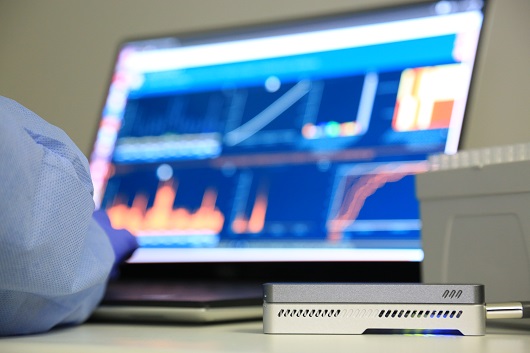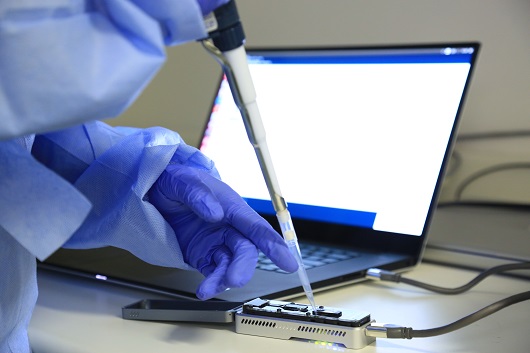Fiocruz Genomics Network detects novel alterations in the Sars-CoV-2 Spike protein in Brazil
26/03/2021
Vinicius Ferreira (IOC/Fiocruz)
Scientists at the Fiocruz Genomics Network have identified important changes in the Spike (S) protein structure of the Sars-CoV-2 virus circulating in Brazil. Eleven gene sequences showed deletions (loss of genetic material) in the initial region of the protein and in four there was some amino acids insertion. The Spike protein is associated with the pathogen's ability to enter human cells and is one of the main targets of the neutralizing antibodies produced by the body to block the virus.

Photo:Josué Damacena, IOC/Fiocruz
The discovery is the result of genomic surveillance conducted by Fiocruz in the country and partner institutes that are daily engaged in generating more robust data about the behavior of the virus and contribute to better prepare the country to face the pandemic. The scientists point out that, so far, few genomes show the changes and that it is not yet characterized as the formation of a Sars-CoV-2 new strain. However, they warn that it is necessary to continue monitoring to see if viruses with these changes will not increase in frequency.
"We can say that this is an early discovery, which emphasizes the importance of actions in genomic surveillance, such as the one carried out by the Fiocruz network," explains the head of Laboratory of Respiratory Viruses and Measles at the Oswaldo Cruz Institute (IOC/Fiocruz), researcher Marilda Siqueira. The Laboratory acts as a National Reference Center for respiratory viruses for the Ministry of Health and as a reference for the World Health Organization (WHO) in Covid-19 in the Americas.
The new results detected using genetic sequencing methodology, come from samples collected from patients in seven states: Amazonas, Bahia, Maranhão, Paraná, Rondônia, Minas Gerais, and Alagoas. The modifications occurred in the amino (N)-terminal domain (NTD), which can make it difficult to bind with antibodies and thus promote the immune escape of the virus in the human body. But the scientists say that further experimental data is needed to test this hypothesis in the strains circulating in the country.
A sample collected in Amazonas showed a deletion in gene sequence linked to the B.1.1.28 lineage. Four samples from Bahia, two from Alagoas, and one from Paraná showed losses in sequences characterized as the P.1 strain. One sample from Minas Gerais presented the alteration in the P.2 strain. Two samples from Maranhão showed the deletion in strain B.1.1.33, which also contained the E484K mutation.
Three samples from Amazonas and one from Paraná contained an insertion of genetic material in sequences from the B.1.1.28 strain (P.1-like) - so-called because it is very similar to P.1. One sample collected in Paraná and all in Bahia and Alagoas are from patients coming from the Amazonas state or with a history of travel to the region. The results were published on the MedRxiv preprint platform.

Photo:Josué Damacena, IOC/Fiocruz
"The novel coronavirus is continually adapting and thereby providing for the emergence of new variants of concern and interest with alterations in the Spike protein. However, it is worth noting that the new mutations have so far been detected at low frequency, despite being found in different states. We still need to measure the impact of this finding and, without a doubt, expand genomic monitoring even more", points out virologist Paola Cristina Resende, from the same Laboratory, who acts as curator coordinator of the international genomic platform GISAID in Brazil.
The scientists believe that the new deletions and insertions are associated with a virus convergent evolution since they were detected in different lineages. "The variants identified in Brazil until then had not shown the deletions and insertions that are common in variants from other countries, such as the United Kingdom and South Africa. Here we see for the first time, that the Brazilian strains are following the same evolutionary path as the other variants of concern. The mutations have now reached another viral protein important point, the NTD domain, which is recognized by some specific neutralizing antibodies," points out Gabriel Wallau, who is a member of the Bioinformatics Center of the Genomic Network and a researcher at the Aggeu Magalhães Institute (Fiocruz Pernambuco).
According to the scientists, the sequence mutations accumulation observed domestically closely resembles the pattern observed in South Africa, where the variant of concern B.1.351 first acquired mutations in the RBD domain (E484K and N501Y) and subsequently displayed a deletion in the NTD domain. "This new variant generation may be less susceptible to antibody neutralization than their parental strains P.1, P. 2 and B.1.1.33. The Covid-19 pandemic in 2021 in Brazil will probably be dominated by this new and complex set of variants," reports researcher Tiago Gräf from the Gonçalo Moniz Institute (Fiocruz Bahia).
The Fiocruz Genomics Network researchers warn that the findings highlight the urgent need to scale up vaccination and implement effective non-pharmacological measures to mitigate community transmission and the more transmissible variants emergence. They also point to investment in genomic surveillance and vaccine efficacy studies for the new variants as key measures.
The research was conducted by the Fiocruz Genomics Network, with the participation of researchers from several states in the country. The study was led by the Respiratory Virus and Measles, and AIDS and Molecular Immunology Laboratories of IOC/Fiocruz, the Gonçalo Moniz Institute (Fiocruz-Bahia), the Leonidas and Maria Deane Institute (Fiocruz Amazônia), the Aggeu Magalhaes Institute (Fiocruz-Pernambuco), and the Federal University of Espírito Santo (Ufes).
Also collaborated with the work: the Health Surveillance Foundation of Amazonas and Central Public Health Laboratories of Amazonas (Lacen-AM), Maranhão (Lacen-MA), Alagoas (Lacen-AL), Minas Gerais (Lacen-MG), Paraná (Lacen-PR), and Bahia (Lacen-BA).
Previous Unprecedented Result
Recently, the Fiocruz Genomics Network identified a new Sars-CoV-2 strain in Brazil. Called N.9, the strain was characterized as a variant of interest because it contains a mutation in the novel coronavirus S protein, known as E484K, which is associated with immune system evasion and found in other strains with widespread on the planet, including the variants of concern P.1 and B.1.351. The change was detected in 35 samples collected between November 2020 and February 2021 in ten states in the South, Southeast, Northeast, and North of the country.
First identified in São Paulo, the strain was later found in Santa Catarina, Amazonas, Pará, Bahia, Maranhão, Paraíba, Pernambuco, Piauí, and Sergipe. The viruses genome analyses indicate that the N.9 variant appeared in August 2020. The São Paulo state is pointed out as the most likely place of origin, but it is also possible that the lineage originated in Bahia or Maranhão. The discovery is published in preprint form on the bioRxiv platform.
Virologist Paola Cristina Resende, from the Respiratory Virus and Measles Laboratory at IOC/Fiocruz, explains that the E484K mutation probably originated between July and August 2020, in the B.1.1.28 and B.1.1.33 strains, the most prevalent circulating in Brazil at that time. "From October on, with the virus dissemination acceleration, the E484K mutation spread throughout the country, coinciding with a major change in the Sars-CoV-2 evolution profile in the world," she says.




